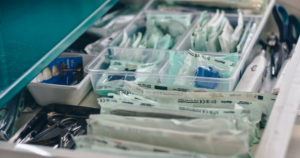
We’re all used to routine dentistry. In general, it’s recommended that people see a dentist for regular check-ups and cleanings every six months. During those cleanings, the teeth will usually be inspected, and there may be dental X-rays taken of the teeth to inspect them on a more internal level. Most of the time, the worst that these x-rays will discover is a cavity, or in more serious cases perhaps an abscessed or impacted tooth. Usually, issues discovered at the dentist’s office can be solved with outpatient procedures or minor oral surgeries. Ultimately, most people don’t need to worry about spending a lot of time recovering from dental procedures.
But what happens if you undergo a dental emergency? Dental emergencies are not common, and most of us will never experience them in our lifetimes. But accidents happen, and sometimes you may escape relatively unscathed without an injury that requires the emergency room, but with a dental injury that requires immediate care. There are in fact emergency dental services available, but many don’t know what to do leading up to them, or what they may involve. With that being said, let’s look into what you should do if a dental emergency occurs. it’s important to understand that your immediate actions will likely have a great bearing on the outcome of the event, regardless of what exactly has happened.
When most of us think of a dental emergency, we think of a tooth that has been broken or completely dislodged. A lot of people panic immediately if their teeth are broken or dislodged, but it’s important to stay calm in the moment. Either contact your dentist directly or have someone contact them for you if you are unable to do so. But you must stabilize the traumatized area first, rinsing your mouth with warm water and applying a cold compress to the injured area. Usually, if a tooth has been completely dislodged it will need attention within 30 to 60 minutes if there is going to be any hope of saving the original tooth.
In the case of a broken tooth, there usually is not going to be a way to reattach the broke part. Often, the tooth will be rebuilt, as the original tooth and root will still be attached. However, if the entire tooth has been dislodged you should take care to preserve it. Hold the tooth by the crown, and simply rinse it in water; if there is tissue attached to the tooth still, do not rinse that area. Ideally, the tooth should be held in its socket as you make your way to the dentist’s office. If it cannot be held in the socket, it should be held in a glass of milk or within your own saliva. If you’re the person trying to keep the tooth preserved, perhaps because you’re attempting to take care of your child’s teeth, you will probably need to preserve the tooth separately while getting in touch with your child’s pediatric dentist. Though at the same time, understand that you may need to see a different dentist entirely, or an oral surgeon in some cases.
As previously mentioned, in some dental emergencies the tooth is merely broken, cracked, or chipped and can therefore be rebuilt. And in some cases, a dislodged tooth can be put back in place. But in many cases, too much damage has been done, and the tooth cannot be put back in place. Luckily, there are a lot of great alternative options. Most of the time, the alternative for a dislodged tooth is a dental implant. The dental implant will do all the work of a real tooth, and at the same time will maintain its appearance as well. There is of course a cost that comes with getting an implant. But it’s a great option in the case of a dental emergency.
Clearly, it’s natural to be afraid during a dental emergency. However, there are treatments available that make it easier to move on after a dental emergency. Be proactive, and your results should be successful.